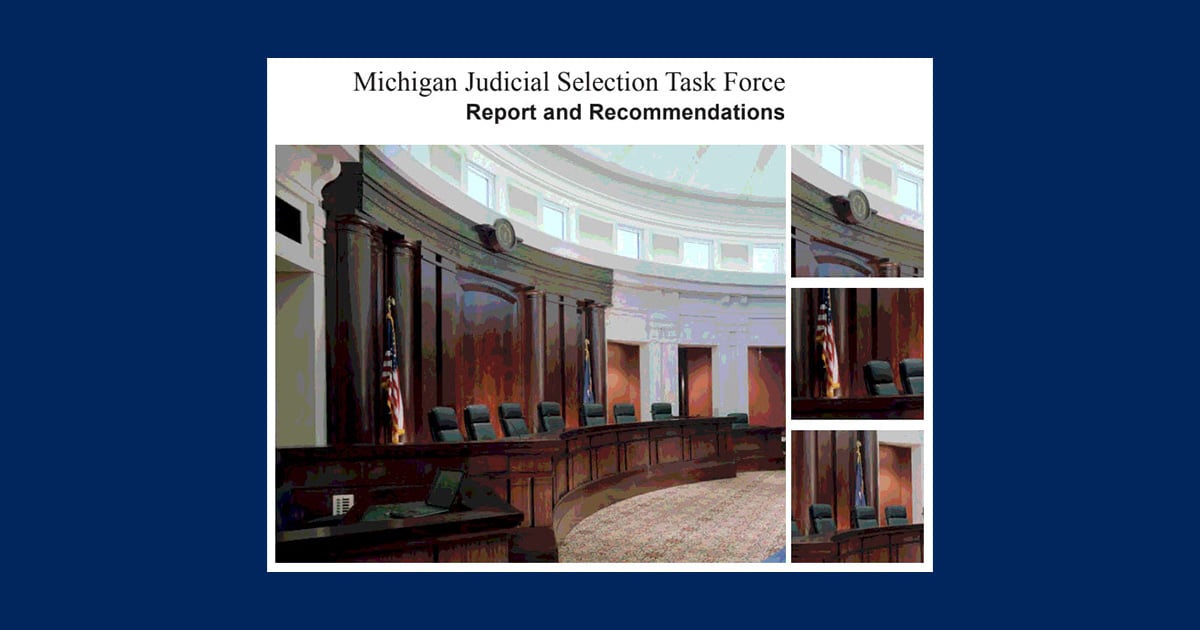What Should Be Done About Michigan's No-Good, Very Bad Way of Selecting Supreme Court Justices?

THE PAST
The "Looking Back: 1930s" article in the January 2022 Michigan Bar Journal concludes by briefly noting "a failed constitutional amendment which would have moved Michigan away from an elected judiciary." The ballot measure would have instituted non-partisan appointment of Michigan’s Supreme Court justices.
Since that 1938 defeat, the State Bar has initiated or supported petition drives to put the question of non-partisan judicial selection back on the ballot three more times.
- In 1978 the State Bar led a drive to amend the constitution to provide for commission-nominated appointment of appellate judges with retention elections. They fell far short of the required 300,000 petition signatures.
- Then-Lt. Governor James H. Brickley led a similar effort in 1981. Endorsed by the State Bar, it likewise failed to garner enough signatures.
- In 1984 former Chief Justice (and Cooley Law School founder) Thomas E. Brennan advocated a more modest plan that would eliminate party nomination. The State Bar’s Representative Assembly supported the Brennan plan by a nearly 2-to-1 margin. But the petition drive sputtered.
MORE RECENTLY
Twenty-five years later, an independent Michigan Judicial Selection Task Force was formed to study the topic. Former Michigan Supreme Court Chief Justice Marilyn Kelly and Senior Judge James L. Ryan of the U.S. 6th Circuit Court of Appeals co-chaired the Task Force.
The Task Force recommended eight reforms to remove what the members saw as excessive partisanship in selecting our justices. Included were open primary elections for the Supreme Court and a non-partisan screening commission for vacancy appointments.
At its April 27, 2013 meeting the Representative Assembly listened respectfully to Justice Kelly’s presentation of the Task Force recommendation but took no action.
THE PROBLEM
Here’s how the present selection process works. Candidates for the Michigan Supreme Court are elected on the non-partisan ballot, without party labels. But they can only reach the ballot by nomination of a political party.  Vacancies are filled by unfettered gubernatorial appointment. According to the Michigan Supreme Court Historical Society, from 1963 to 2012 nearly one-half of Michigan’s justices gained their seats that way.
Vacancies are filled by unfettered gubernatorial appointment. According to the Michigan Supreme Court Historical Society, from 1963 to 2012 nearly one-half of Michigan’s justices gained their seats that way.
Many thoughtful people have criticized this non-partisan-in-name-only process. Revered University of Michigan law professor and former Wayne State University law dean John W. Reed—a model of reserve—called the process “a bit crazy” and added that “it does not work to Michigan’s advantage.”
Here is how other respected personages have described the process:
- Federal District Judge John Feikens: “Archaic.”
- Chief Justice Mary Coleman: “Ludicrous.”
- Chief Justice Elizabeth Weaver: “Deeply flawed.”
- Chief Justice Marilyn Kelly: “Ridiculed nationwide.”
- State Bar President Thomas Kienbaum: “Illogical and misleading.”
- State Bar President Jon Muth: “The worst possible system.”
- State Bar President Thomas Ryan: “Beneath the dignity of our judiciary.”
- Court of Appeals Chief Judge Robert Danhof: “At a minimum, nomination ought to be taken out of the party conventions.”
- The Task Force Report: “Michigan most certainly deserves better.”
THE FUTURE?
Contrary to popular belief, reducing partisanship does not require amending the constitution. Professor Reed identified two “crazy” aspects in particular need of reform: political-party nomination of Supreme Court candidates, and filling vacancies by unfettered appointment.
As to party nomination, Article VI, section 2, says only this: “Nominations for justices of the Supreme Court shall be in the manner prescribed by law.” The legislature could provide by statute for nomination by non-partisan primary election, as with the Court of Appeals, or by a non-partisan nominating commission.
As for unfettered appointments, governors in almost half the states have, at one time or another, instituted “voluntary merit selection” by executive order. Typically they require the governor to make judicial appointments from a list of names from a nominating commission.
Is it time for the Representative Assembly to take up the Task Force report again? “If there is even the possibility that the selection of judges and justices of the Michigan appellate courts may be changed, discussion and debate should begin and be led by us, as members of the organized bar.” (State Bar President Thomas J. Ryan, 2001)
Otto Stockmeyer taught for more than 35 years at Cooley Law School. Now retired, he serves as a commentator on law, legal education, and law student success. He had an insider’s view of some of the matters described as a member of the State Bar’s Special Committee on Judicial Selection, 1978-1983, and the Standing Committee on Judicial Qualifications, 1988-1991. This post is from his LinkedIn article, available here.

